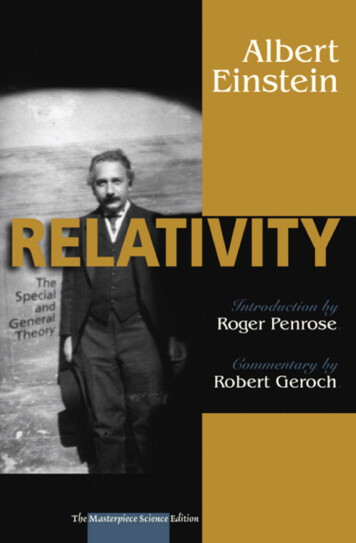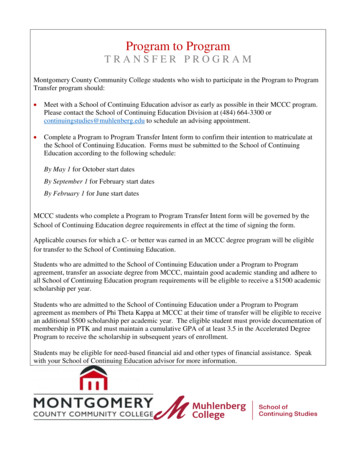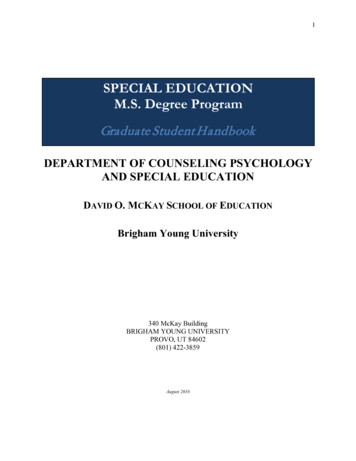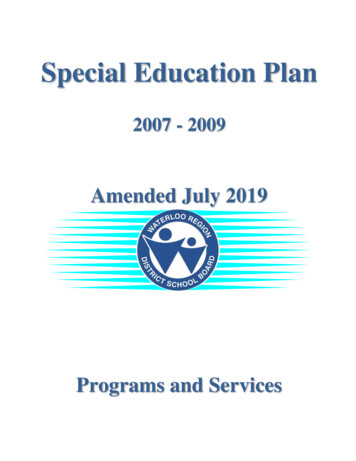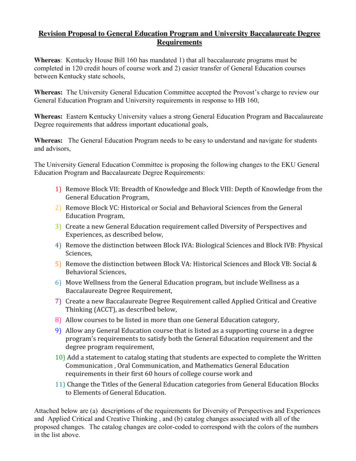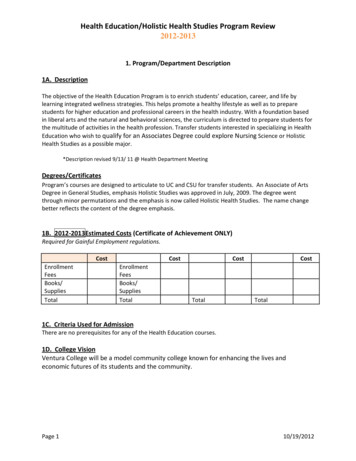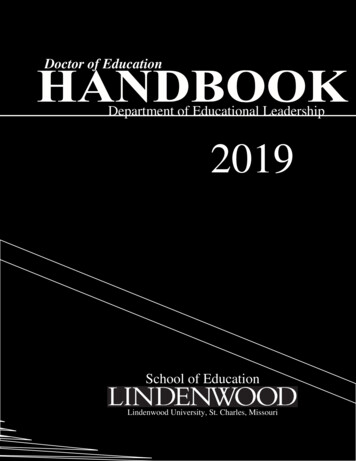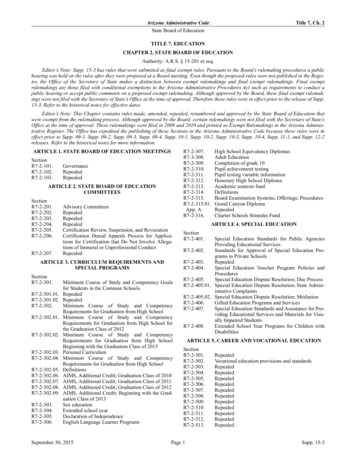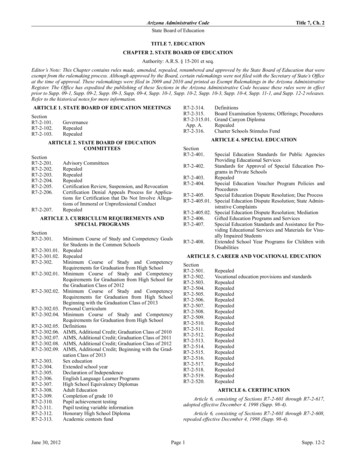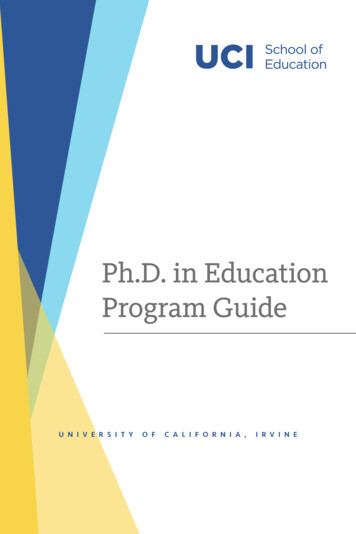
Transcription
Ph.D. in EducationProgram GuideU N I V E R S I T YO FC A L I F O R N I A ,I R V I N E
2Why a Ph.D. in Education at UCI?3Areas of Focus4Our Faculty6Labs & Centers10Orange County EducationalAdvancement Network (OCEAN)12Student Profiles14Alumni Profiles18About UCI21Fast Facts22Funding & Application Requirements23About Orange County24ContentsDean’s Welcome
Dean’s WelcomeThank you for your interest in the UCI School of Education’sPh.D. in Education program. As you will learn from this booklet,our doctoral program is focused on advancing educationalsciences and contributing to improved educational opportunitiesand outcomes for individuals across the entire lifespan. Weare a diverse, dynamic, and collaborative institution, and ourresearch, community partnerships, and programming arededicated to producing innovative scholarship, addressing theneeds of local schools, and preparing students for careers inacademia, nonprofits, government, and the private sector.At the UCI School of Education, there is no limit to the researchyou can undertake, or faculty with whom you can collaborate.As of June 2020, our faculty were principal investigators on grants whose combined totalexceeded 96 million - and the research on these grants demands the contributions ofdoctoral students such as yourselves. The curriculum at our school draws on perspectivesfrom neuroscience, economics, sociology, psychology, anthropology, and more. At theSchool of Education, you will have an unparalleled chance to grow into a conscientious andwell-rounded academic.The University of California, Irvine is consistently recognized as a leader in higher education.In 2019, Money ranked UCI the No. 1 Best College in the U.S. UCI was also ranked the “No. 1university doing the most for the American dream” by the New York Times. UCI is an AsianAmerican-, Hispanic-, and Native American Pacific Islander-serving institution.Our campus is in the heart of Orange County, the nation’s sixth most populous county.Surrounding us is a diverse K-12 student population and dozens of school districts whosegoals and demands are rapidly evolving. Through strategic partnerships, you will have theopportunity to work on the ground floor with local schools to create tangible improvementsfor our county’s students and teachers.Thank you for your interest in our program. If you have any questions, please contact ourStudent Affairs Office, whose information can be found on page 23.Why a Ph.D. in Education at UCI?Focus your research in one of three areas (see page 4)Collaborate with world-renowned faculty who, combined, areprincipal investigators on 96 million in grants (1)Conduct research in the heart of Orange County, the nation’s sixthmost populous county, featuring 28 school districts and 500,000 K-12 studentsStudy at the No. 20 graduate school of education in thenation – No. 10 among public universities (2)Receive guaranteed funding for five yearsSpark inspiration from the No. 1 university doing the most for theAmerican dream (3)Join students with a vast array of backgrounds: students historicallyhail from dozens of states and countries, and have a wide range of work andeducational experiencesLive on-campus in beautiful Orange County with five years of graduatehousing - 15 minutes to the beach!I hope to see you in the fall.Sincerely,Richard ArumDean and ProfessorUniversity of California, Irvine School of Education21 – Data as of June 20202 – U.S. News & World Report “2021 Best Education Schools”3 – New York Times, 2017 College Access Index3
Areas of FocusStudents in the Ph.D. in Education program are required to take12 courses total, eight core courses, and have the ability to focustheir research in one of three areas.At the UCI School of Education, doctoral students are notcommitted to working with one professor for the entirety of theirstudies. Rather, students can work with different faculty astheir research interests evolve. As a result, students becomewell-rounded educators exposed to a variety of research areas.Educational Policy and Social Context (EPSC)Drawing from economics, sociology, developmental psychology, and anthropology,EPSC faculty and students use a range of quantitative, qualitative, and mixedmethod approaches to understand impacts of existing policies, to design andevaluate new policy and intervention models, and to understand the relationshipbetween policy making and implementation.Human Development in Context (HDiC)Drawing on education, cognitive science, neuroscience, developmental psychology,and anthropology perspectives, faculty and students conduct lab experiments,engage in field-based studies, and use longitudinal data sets to examine humandevelopment in a wide range of areas. Research in this area contributes to buildingtheory on human development across the lifespan and intervention efforts.Teaching, Learning and Educational Improvement (TLEI)Drawing on a range of research perspectives, TLEI students investigate teachingand learning in schools, communities, online settings, and informal learningcontexts across a range of disciplines. Students utilize case studies, design-basedimplementation research, research-practice partnerships, evaluations of learningoutcomes, and text and data mining to improve the life chances of children andadults through education.45
Our FacultyThe UCI School of Education is home to a diverse and internationally recognized groupof faculty dedicated to research that advances educational science and improves learningoutcomes for all students, regardless of background. Our faculty’s research interests arewide-ranging; they include developmental psychology, learning analytics, immigration,STEM participation, afterschool activities, and more. As of June 2020, our faculty wereprincipal investigators on grants whose combined total exceeded 96 million.Shanyce Campbell, AssistantProfessor: Educational Inequity,K-12 Education Policy, TeacherPreparation & EffectivenessGustavo Carlo, Professor: Prosocial& Moral Development, Child &Adolescent Development, Parenting& Families, Risk & Resilience, CrossNational & Cross-Cultural ResearchPenelope Collins, Associate Professor:Reading & Writing Development,Bilingualism & Biliteracy, DigitalLiteracy, Academic Language,Engagement in LiteracyGil Conchas, Professor: Diversity& Equity in Education, Race &Urban Education, Immigration,School ReformAnneMarie Conley, AssociateProfessor: Motivation in Education,Adolescent Development, PersonCentered Approaches to StudyingChangeShayan Doroudi, Assistant Professor:Educational Data Sciences, EducationalTechnology, Learning SciencesJune Ahn, Associate Professor:Learning Technologies, ResearchPractice Partnerships, HumanComputer Interaction, EducationalTechnology, Data Use & AnalyticsRichard Arum, Dean, Professor:Legal & Institutional Environmentsof Schools, Social Stratification,Digital EducationDrew Bailey, Associate Professor:Mathematical Development,Individual Differences,Longitudinal MethodsNia Dowell, Assistant Professor:Learning Analytics, ComputerMediated Collaborative Interaction,Computational LinguisticsGreg Duncan, DistinguishedProfessor: Economics of Education,Program Evaluation, ChildDevelopmentJacquelynne Eccles, DistinguishedProfessor: Academic Motivation &Achievement, School & FamilyInfluences on Adolescent Development,Gender & Ethnicity in STEM FieldsRachel Baker, Assistant Professor:Educational Policy, Inequality, HigherEducation, Economics of EducationLiane Brouillette, Professor:Educational Leadership, SchoolReform, Arts EducationAndres Bustamante, AssistantProfessor: Early ChildhoodScience Education, Head Start,Approaches to Learning,Community-Based InterventionGeorge Farkas, DistinguishedProfessor: Achievement Gap,Educational Inequality, EarlyChildhood, Afterschool ProgramsBrandy Gatlin-Nash, AssistantProfessor: Achievement Gap, Culture &Learning, Diversity & Equity, Language& Literacy Acquisition & Instruction,Learning Disabilities, LinguisticDiversity, Race & Urban Education,Teacher Education, WritingShane Goodridge, Assistant TeachingProfessor: Educational History,Philosophy, Charter School Movement67
Constance Iloh, Assistant Professor:Educational Equity, College Access &Choice, Educational Stratification,Institutional Behavior, Anthropologyof Education, College Student Learning& DevelopmentSusanne Jaeggi, Associate Professor:Cognitive Training Interventions,Working Memory & CognitiveFunctions Across the LifespanJade Jenkins, Assistant Professor:Early Childhood Development,Child & Family Policy, PolicyAnalysis & Management, ProgramEvaluationFernando Rodriguez, AssistantProfessor of Teaching: Study Methods,STEM Education, Learning AnalyticsJudith Haymore Sandholtz, Professor:Teacher Professional Development,Teacher Education, School-UniversityPartnershipsRossella Santagata, Professor:Mathematics Education, Video &Multimedia in Teacher Learning,Culture & Learning, Equity & EducationHosun Kang, Associate Professor:Science Education, Teaching & TeacherEducation, STEM, Gender, Identities,Social Justice, Diversity & EquityYoung-Suk Kim, Professor, Sr.Associate Dean: Language & LiteracyAcquisition & Instruction, Early LiteracyPredictors, Reading Fluency, ReadingComprehension, WritingCarol Booth Olson, ProfessorEmerita: Academic Writing,Language Arts, Adolescent LiteracySandra Simpkins, Professor: OrganizedAfterschool Activities, Motivation,Family Influences, Diversity & Equity,Immigration & Culture, STEMElizabeth van Es, Professor:Teacher Preparation & ProfessionalDevelopment, Teaching Mathematicsfor Equity, Teaching Practice, Video &Teacher Learning, Design of LearningEnvironmentDeborah Lowe Vandell, Chancellor’sProfessor Emeritus: DevelopmentalProcesses & Educational Outcomes,Longitudinal Research Methods, EarlyChildhood Education, AfterschoolPrograms, Teacher-Child RelationshipsElizabeth Peña, Professor, AssociateDean of Faculty Development andDiversity: Bilingualism, LanguageImpairment, Test Development &TreatmentEmily Penner, Assistant Professor:Educational Inequality, EducationPolicy, K-12 Educational Interventions,Family & Peer Impacts on AchievementKylie Peppler, Associate Professor:Intersection of Arts, ComputationalTechnologies & Interest-DrivenLearningAdriana Villavicencio, AssistantProfessor: Inequities in Education,Racial Equity Frameworks, EnglishLearning & Immigrant StudentsMark Warschauer, Professor:Digital Learning, Language &Literacy, STEM, Learning AnalyticsJulie Washington, Professor:Intersection of Literacy, LanguageVariation, & Poverty, Use &Development of African AmericanEnglish, Achievement Gap, LanguageDevelopment, Language DisordersStephanie Reich, AssociateProfessor, Associate Dean ofGraduate Program: Socio-EmotionalDevelopment, Parent-ChildInteractions, Peer Networks,Social Affordances of TechnologyKatherine Rhodes, AssistantProfessor: Mathematical Cognition,Language Ability, Cognitive ControlLindsey Richland, AssociateProfessor: Children’s Reasoning,Higher-Order Thinking,Mathematical Thinking, ExecutiveFunctionDi Xu, Associate Professor: EconomicReturns to Higher Education, FinancialAid to Higher Education, Effects ofGovernmental Policies & Projects onEducational Equity & Efficiency89
Labs & CentersFaculty and doctoral students at the UCI School of Education areaddressing key issues that, collectively, address the entirelifespan of human development and learning. Students at theSchool of Education are encouraged to join faculty research labs,centers, projects, and initiatives so they too can contribute tocutting-edge research and launch careers of their own that helpimprove educational opportunities and outcomes.More information on each of these labs, centers and projects,along with their directors, is available on the UCI School ofEducation website: http://education.uci.edu/centers.htmlAfter-School Activities ProjectCalifornia Teacher EducationResearch and Improvement Network(CTERIN)Center for Afterschool and SummerExcellence (CASE)Center for Creating Opportunitiesthrough EducationCenter for Educational PartnershipsCenter for Learning in the ArtsCenter for Research on TeacherDevelopment and ProfessionalPracticeCoATTENDConnected Learning LabCollins Literacy LabCreativity Labs at UCIDevelopment in Social Context Lab(DISC)10EPSC LabProject ReachHuman Abilities in BilingualLanguage (HABLA) LabSuper Science SquadLanguage, Literacy, & Learning(L3) LabLearning Analytics Laboratory(LA-Lab)Learning from Teaching ResearchGroupMotivation & Identity Research Lab(MIRL)UCI Science of Learning LaboratoryVariations in Oral and WrittenEnglish Language (VOWEL) LabWorking Memory and Plasticity LabWriting Research to ImproveTeaching and Evaluation(WRITE) CenterSocial, inTegrated, Engaged, &Meaningful (STEM) Learning LabOnline Learning Research CenterDigital Learning Lab (DLL)Pathway ProjectEarly Childhood Policy ResearchGroupProject Crystal11
OCEANEstablished in fall 2018, OCEAN is a network of research practicepartnerships (RPPs) between K-12 schools and the School ofEducation. In each RPP, a School of Education faculty member anda doctoral student are matched with a local school. The entireteam of K-12 educators, leaders, and researchers develop a researchproject that addresses key goals and needs of the local schoolcommunity.The schools then meet with one another to identify and addresstheir common, complex problems. Orange County schools,alongside the School of Education, can mobilize to implement ameasured, trackable improvement plan that identifies anddisseminates effective practices to affect multiple schoolssimultaneously.OCEAN provides doctoral students the experience of conductingtargeted research that addresses the concrete, pragmatic needsof K-12 schools.“Being a part of OCEAN has given meinvaluable experiences in co-designingresearch for improvement with schoolpartners. The most important lessonfor me is learning how to communicateresearch to different educationalstakeholders, such as the principal,teachers and district staff.”Ha Nguyen, Third-Year Doctoral StudentNguyen created a dashboard to facilitate conversationswith teachers about school connectedness and students’English language development.“I hope my research will be used tostart conversations; OCEAN is in anextraordinary position to have animpact in Orange County, California,and the United States – there aren’tmany of these networks around.”Yenda Prado, Fifth-Year Doctoral StudentPrado is collecting data to understand how an inclusive educationmodel can be adapted to distance learning.“Graduate students who have beentrained in this network can go on to serveas faculty all over the country. At thatpoint, they too can direct and steer similarinitiatives in their respective communities,and improve education across the nation.”June Ahn, Director, OCEAN and Associate Professor1213
STUDENT PROFILESDoctoral students at the UCI School of Education study a widerange of issues that affect human learning and development.They are paired with leading faculty who share similar researchinterests and can help the doctoral student grow into a wellrounded academic.The doctoral program student body is diverse – studentshistorically matriculate from multiple countries and states. Whilenot required, many of our students have years of work experienceand/or additional post-baccalaureate degrees.Our students serve as teaching assistants, graduate studentresearchers, mentors to undergraduates, and leaders of studentinitiatives across campus. Career goals vary, but one commonthread exists – a desire to change the world for the better.Hye Rin LeeAdvisor: Distinguished Professor Jacquelynne EcclesThird-year doctoral student Hye Rin Lee is enriching her study of achievement motivationas a member of four different research teams. On a project with Distinguished ProfessorJacquelynne Eccles and the UCI School of Engineering, Hye Rin is researching how to leverageYouTube to increase STEM persistence and identity. Research with Associate ProfessorDrew Bailey is examining associations between various motivational constructs. A projectwith Assistant Professor of Teaching Fernando Rodriguez aims to understand students’motivation in an online context. Lastly, research with Dean Richard Arum on the NextGeneration Undergraduate Success Measurement Project team is examining the undergraduateexperience at UCI. In addition to her academic pursuits, Hye Rin appreciates the “close-knitcommunity among graduate students” at the School of Education. Hye Rin is looking forwardto continuing her research interests as a professor at a research institution.Melissa DahlinAdvisors: Associate Professor Stephanie Reich,Assistant Professor Jade JenkinsBefore enrolling at the UCI School of Education, fourth-year doctoral student Melissa Dahlintaught preschool in Taiwan for five years, earned a master’s degree in InternationalEducational Development at Columbia University, spent six years in Washington, D.C. inpolicy and evaluation work, and volunteered with the Homeless Children’s Playtime Project.When asked why she was pursuing a doctorate at UCI, Melissa explained, “The School ofEducation’s doctoral program is preparing me to return to the field with much strongeranalytic skills and deeper content knowledge to do this work well.” For her doctoral studies,Melissa is focusing on childhood development, parenting, and early childhood policy. Shecomplements her research work by serving as president of the Associated Doctoral Studentsin Education, a representative to Associated Graduate Students, a member of the Schoolof Education’s Diverse Educational Community and Doctoral Experience committee, and aboard member for the Orange County Association for the Education of Young Children.14Joseph MontoyaAdvisors: Professor Mark Warschauer, Associate ProfessorHosun KangSecond-year doctoral student Joseph Montoya chose to attend the UCI School of Educationbecause of the close relationships with the local community and school districts. Joseph’stime as a high school biology teacher, Career Technical Education (CTE) department chair,and community college instructor encouraged his enrollment in the School’s doctoralprogram to explore STEM education and how CTE pathways include or exclude marginalizedcommunities. Currently, Joseph is a graduate student researcher on an National ScienceFoundation-funded computational thinking grant, and is also working with researchers fromthe Center for Integrated Facilities Engineering at Stanford University to study workforcepathways from secondary to post-secondary education. When asked about his future plans,Joseph explains, “I would like to continue to do research in service to my community.”15
Melina PinalesAdvisors: Distinguished Professor George Farkas,Assistant Professor Jade JenkinsChristopher WegemerAdvisor: Distinguished Professor Jacquelynne EcclesFifth-year doctoral student Melina Pinales came to the UCI School of Education withexperience in childcare, where she developed a passion for addressing children’s needsthrough policy implementation. Taking advantage of UCI’s interdisciplinary opportunities,Melina has fully engaged in her doctoral experience. She is Project Coordinator onDistinguished Professor George Farkas’s Reading One-to-One, a program that deliversresearch-based reading instruction to K-2 students in Santa Ana. In addition to providing datafor her dissertation, Melina’s research findings are being used to inform school leaders ofinstructional practices that seem most promising in promoting students’ literacy skills,especially those who come from Spanish-speaking backgrounds. In addition to academics,Pinales appreciates the beautiful coastline that Orange County offers. “I absolutely lovebeing near the beaches. Whether I’m cruising on a boat, having a picnic with my friends, doingyoga on the beach, or meditating alone while listening to the sound of the waves, there’snothing that brings me greater joy and calmness than being near the water.”Fifth-year doctoral student Christopher Wegemer is driven by three passions: “pursuit ofsocial justice, love for teaching, and a desire to learn.” Christopher’s desire to learn led himto two bachelor’s degrees in Applied Physics and Electrical Engineering and two master’sdegrees in Global and International Studies and Education. Love for teaching encouraged histeaching at an international high school and summer teaching in Honduras. A self-described“scholar-activist,” Christopher applied his leadership talents to a variety of social justiceendeavors, including United Students Against Sweatshops, Workers’ Rights Consortium, andAmerican University Preparatory Academy consulting. Christopher’s dissertation is buildingon his commitment to youth civic engagement. His research is drawing from his currentwork with a local high school, and with Dean Richard Arum’s Next Generation UndergraduateSuccess Measurement Project, examining the relationship among UCI students’ civicengagement, education, and psychological factors related to their coronavirus responseand behavior.Khamia PowellAdvisors: Distinguished Professor Jacquelynne Eccles,Assistant Professor Adriana VillavicencioBefore coming to the UCI School of Education, fourth-year doctoral student Khamia Powelltaught at Title I schools, serving the most vulnerable and underserved communities alongthe outskirts of Washington D.C. and Atlanta. “I loved teaching, but I noticed that thehigh expectations, positive teacher-student interactions, and love that defined our classroomand learning experiences for my general education students, gifted education students,and especially my students of color was not typical for similar students of color fromunderserved communities right next door or down the hall.” Looking to make a greaterimpact, Khamia matriculated to the School of Education because of its mission of elevatingand celebrating diverse communities and scholars. “I was once told that to attract peopleof color, there needs to be faces of color. That’s why I came here - to support our commitmentto serving the most vulnerable, to be an advocate for my students and their communities,and to advance the mission and goals of UCI and the School of Education.”16Ying XuAdvisor: Professor Mark WarschauerFifth-year doctoral student Ying Xu earned her bachelor’s and master’s degrees in ChineseLinguistics and Literature, with a focus on human acquisition of language, from China’sSun Yat-Sen University. In 2015, Ying joined UCI’s School of Education as a visiting scholarresearching educational technologies to support diverse student learning. As a doctoralstudent, Ying has worked on a U.S. Department of Education grant supporting a languageprocessing tool to make textual meaning more accessible. On one National ScienceFoundation-funded project, she is partnering with PBS Kids to develop interactive scienceanimation videos. On another NSF project, Ying is exploring artificially intelligentconversational agents to support children’s language development and science learningthrough scaffolded conversations embedded within science animation videos. “I appreciatethe depth of research carried out by the UCI School of Education students, researchers,and faculty, and I am deeply inspired by the School’s commitment to promoting inclusiveexcellence.”17
ALUMNI PROFILESOur alumni are trained in a multitude of approaches to studyinglearning, human development, and educational outcomes. Thisholistic approach makes our alumni attractive candidates for jobsin several industries – academia, nonprofit, and private business.You can find our alumni leading research at education think tanksand nonprofits, working as professors at dozens of universitiesacross the country, and heading up companies they founded.Alumni of the School of Education’s doctoral program are currentlyemployed across the globe, including more than a dozen statesand China, Hong Kong, Kenya, and Korea.Hansol Lee, Ph.D. ’19Associate Professor of English, Korea Military AcademyWhen researching doctoral programs, Dr. Hansol Lee was initially attracted to the School ofEducation’s unique curriculum design that promoted students’ research capabilities. Inreflection, he cites additional benefits from the Ph.D. program’s balance across topics,research methods, professional development opportunities, annual benchmarks in placeof qualifying exams, and wide-ranging opportunities for interdisciplinary research. Lee’sdoctoral experiences included his dissertation work using a structure language data set toanalyze second language acquisition, and three research opportunities where he studiedformative assessments in mathematics, literacy accommodations for ELLs, and English foracademic purposes. Lee graduated with 13 publications in different academic journals,including Annual Review of Applied Linguistics, Applied Measurement in Education, ChildDevelopment, Educational Measurement: Issues and Practice, English Teaching: Practice &Critique, Language Learning & Technology, Modern Language Journal, and ReCALL.Tarana Khan, Ph.D. ’19PBS SoCal Education Research and Evaluation AnalystFor Dr. Tarana Khan, the opportunity to work with renowned scholar and DistinguishedProfessor Jacquelynne Eccles was the driving force for choosing the UCI School ofEducation. Now, Khan is using skills she learned as a doctoral student in her position withPBS SoCal’s Family Math Initiative. “Studying at the School of Education taught me howto be a conscientious researcher, how to present research in a way that is accessible andimpactful, and how to look at data with a careful scrutinization.” Khan ventured to UCIfrom her home in Austin, Texas, expecting to find a culture of collaboration and support andwas not disappointed. For her dissertation, Khan explored undergraduate beliefs about themalleability of their intelligence, their beliefs about the causes of their successes and failures,and how these beliefs impact motivation and achievement in school. Her findings – thatan ability-focused component may be a crucial part of student motivation – have thepotential to inform ongoing large-scale mindset interventions.18Joyce Lin, Ph.D. ’16Assistant Professor, California State University, FullertonDr. Joyce Lin chose the UCI School of Education in large part because of Southern California’sethnic and socioeconomic diversity. “In addition to studying with a multidisciplinary teamof faculty, I wanted to conduct research with and serve the communities that I grew up in.”Lin’s doctoral research focused on how distal parenting contexts are related to the homeenvironments of young children; her mixed-method dissertation specifically addressedhow cultural values were related to experiences of physical punishment. In reflection, she isappreciative that her advisor, Associate Professor Stephanie Reich, was open-minded aboutcareer trajectories and recognizes that the School of Education prepared her well for herpost-doctoral research in Human Development and Family Studies at Purdue University.Opportunities to work with and mentor undergraduates in teaching and research at UCIhelped her understand how much she loved working with undergraduates and solidified herdesire for a tenure-track position at a teaching university.19
About UCINestor Tulagan, Ph.D. ’20National Science Foundation Postdoctoral FellowDr. Nestor Tulagan is a “Double Anteater” – he earned a B.A. in Psychology & Social Behaviorat UCI and his Ph.D. in Education. For his dissertation, Tulagan worked with DistinguishedProfessor Jacquelynne Eccles, integrating two of her theories - Expectancy-Value andStage-Environment Fit - to “explore the possibility that there may be an ‘optimal modulation’,between parents’ control and involvement in their kids’ development and adolescents’growing desire to be in the driver’s seat of their lives.” In September 2020, Nestor joinedthe National Science Foundation’s Social, Behavioral, and Economic Sciences PostdoctoralResearch Fellowship program. He and Professor Sandra Simpkins are studying new researchthey developed in late 2019, focused on leveraging partnerships between math-basedorganized afterschool activities and Latinx families to enhance middle-schoolers’ mathmotivational beliefs and achievement.The University of California, Irvine is consistently recognizedas a trailblazer in a broad range of fields, garnering nationaland international honors in every school. The campus’s diverseacademic offerings paired with world-class leadership createan environment worthy of any passionate, dedicated scholar.Some points of pride include:No. 1 University doing the most for the American dream –New York TimesNo. 1 Best College in the U.S. – MoneyNo. 1 Best Value College, among public universities – ForbesNo. 9 Public University in the U.S. – U.S. News & World Report1 of 65 leading research universities elected into the prestigiousAssociation of American UniversitiesJessica Tunney, Ph.D. ’16Executive Director and Founding Principal of TLC PublicCharter SchoolHispanic-, Asian American-, and Native American PacificIslander-serving institutionAll Data as of June 2020Dr. Elizabeth Tunney designed the TLC Public Charter School as a site for excellence inteaching, innovation, research, and professiona
Why a Ph.D. in Education at UCI? 1 - Data as of June 2020 2 - U.S. News & World Report "2021 Best Education Schools" 3 - New York Times, 2017 College Access Index Focus your research in one of three areas (see page 4) Collaborate with world-renowned faculty who, combined, are principal investigators on 96 million in grants (1) Conduct research in the heart ofAt the UCI School of .

